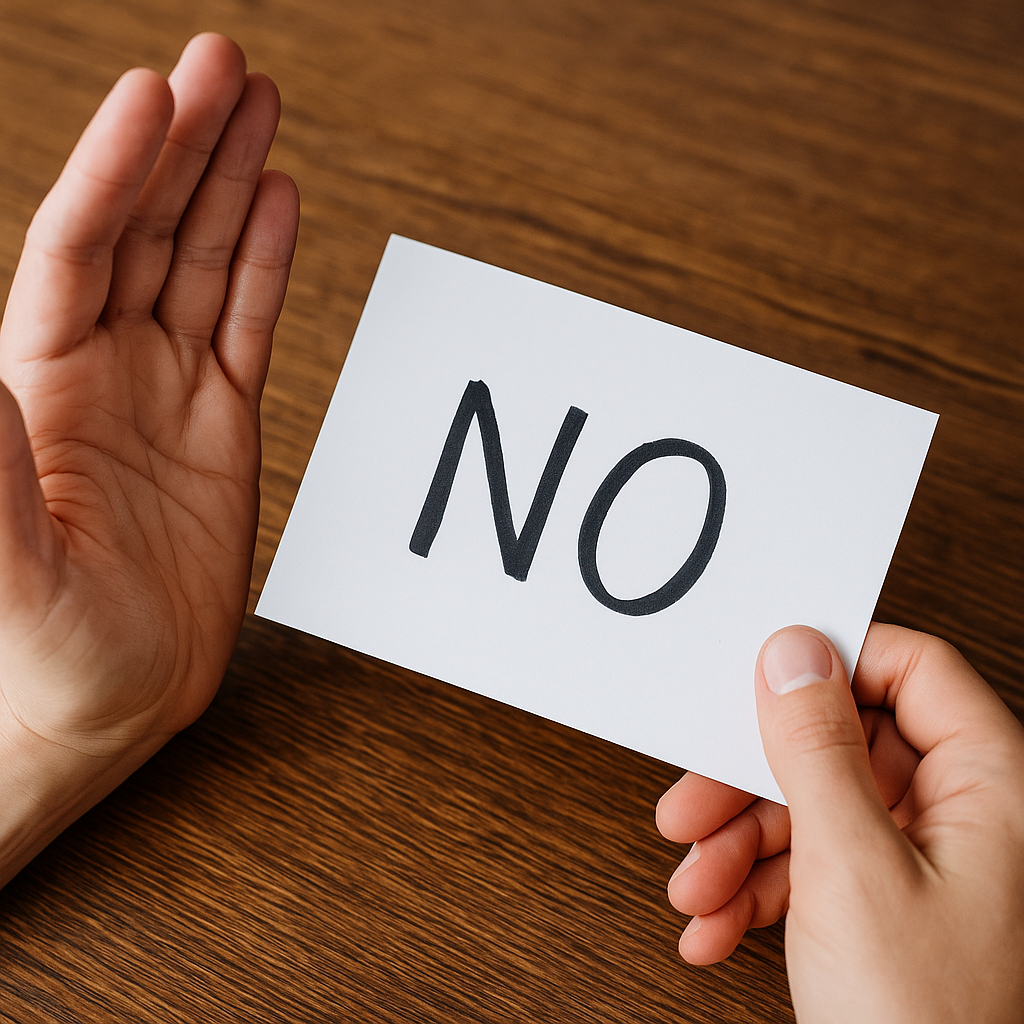Saying “no” is one of the most powerful skills you can develop for personal growth—but for many people, it’s also one of the hardest. Whether it’s declining invitations, setting limits at work, or turning down extra responsibilities, the simple act of saying “no” can bring a wave of guilt, fear, or discomfort.
In this article, you’ll learn why setting boundaries is essential, and how to say “no” clearly, confidently, and compassionately—without guilt.
Why It’s So Hard to Say No
If you struggle to say no, you’re not alone. Most people do. Here’s why:
- Fear of disappointing others
- Desire to be liked or accepted
- Avoidance of conflict or confrontation
- Feeling selfish or rude
- Guilt from prioritizing your own needs
These feelings are natural—but they’re not always truthful. Saying no is not a rejection of others; it’s a commitment to yourself.
The Cost of Always Saying Yes
When you say “yes” to everything, you often say “no” to:
- Your time and energy
- Your peace of mind
- Your true priorities
- Your personal boundaries
Overcommitting leads to burnout, resentment, and stress. Learning to say “no” frees up space for the things that truly matter.
1. Get Clear on Your Priorities
Before you can confidently say no, you need to know what you’re saying yes to.
Ask yourself:
- What are my top 3 priorities right now?
- Does this request align with them?
- What will I be sacrificing if I say yes?
When you know your values, decisions become easier.
2. Remember: No Is a Complete Sentence
You don’t owe long explanations or excuses. Saying “no” politely but firmly is enough.
Try:
- “No, I won’t be able to.”
- “I’m not available for that.”
- “That’s not something I can commit to right now.”
Keep it simple. Adding too much explanation can invite negotiation or guilt.
3. Use Respectful, Assertive Language
Being assertive doesn’t mean being harsh. You can be kind and clear at the same time.
Phrases that work:
- “I appreciate the offer, but I’ll have to decline.”
- “Thanks for thinking of me, but I can’t take that on.”
- “That doesn’t fit into my schedule at the moment.”
Respect for yourself and others creates healthy boundaries.
4. Practice Saying No in Low-Stakes Situations
Build your confidence by starting small:
- Decline a newsletter or online subscription
- Say no to an extra task that isn’t your responsibility
- Let a friend know you need rest instead of going out
Each time you say no, you strengthen your boundary muscles.
5. Delay Your Response
If saying no in the moment feels too hard, create space by saying:
- “Let me check my calendar and get back to you.”
- “Can I think about it and let you know tomorrow?”
- “I need to see what else I’ve committed to first.”
This gives you time to reflect—and to say no more comfortably later.
6. Don’t Apologize for Setting Limits
You are not doing something wrong by saying no. Avoid phrases like:
- “I’m so sorry, but…”
- “I feel bad, but I have to…”
- “I wish I could, but…”
Instead, use neutral, confident language that reflects your self-respect.
7. Replace Guilt with Self-Respect
When guilt shows up, ask:
- “Am I really doing something wrong, or am I just uncomfortable?”
- “What would I tell a friend in this situation?”
- “Is guilt helping me—or is it just trying to keep me small?”
Your needs matter. Your energy is limited. Respecting yourself is not selfish—it’s wise.
8. Role-Play Difficult Scenarios
If there’s someone in your life who’s hard to say no to, practice the conversation.
Try it out loud:
- In front of a mirror
- With a trusted friend
- By writing it down first
The more you rehearse, the less anxious you’ll feel.
9. Understand That You Can’t Please Everyone
No matter how kind or helpful you are, someone will be disappointed. And that’s okay.
Saying yes to please everyone leads to resentment and self-abandonment. Saying no, on the other hand, leads to honesty and empowerment.
Let others handle their disappointment. You are not responsible for their reactions—you are only responsible for your truth.
You Have the Right to Protect Your Peace
Saying “no” is an act of self-care. It’s a declaration that your time, energy, and well-being matter.
Start small. Practice. Stay firm. And when guilt whispers that you’re doing something wrong, remind yourself:
You are simply choosing yourself. And that is more than okay—it’s powerful.
